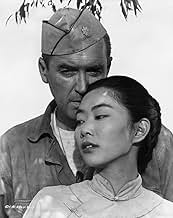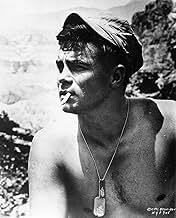Füge eine Handlung in deiner Sprache hinzuA US Army Major stationed in East China in 1944 is ordered to blow up military installations in order to slow down the advancing Japanese Army.A US Army Major stationed in East China in 1944 is ordered to blow up military installations in order to slow down the advancing Japanese Army.A US Army Major stationed in East China in 1944 is ordered to blow up military installations in order to slow down the advancing Japanese Army.
- Regie
- Drehbuch
- Hauptbesetzung
- Sgt. 'Mike' Michaelson
- (as Henry 'Harry' Morgan)
- Bit Role
- (Nicht genannt)
- Chinese Captain
- (Nicht genannt)
- Bit Role
- (Nicht genannt)
Empfohlene Bewertungen
Unfortunately, as the group never comes into contact with the Japanese and is never in serious danger, we don't feel a lot of tension. Whatever threat there is comes from the Chinese themselves, from mobs of starving peasants to bands of wayward deserting marauders.
The most interesting feature of the film deals with the difference of customs. The pomp and ceremony important to Chinese is alien to the Americans just wanting to get down to the business at hand. Looking from different points of view, each side views the other as somewhat barbarous and inhumane and as a result never quite reach the level of friendship each would have.
Although Jerome Morass provides a spirited music score, it doesn't quite fit in with the action, or rather the lack of it. With an exception or two, the events on the screen just never generate much pathos, resulting in a not so poignant anti-war film.
Stewart, as always, is worth watching, Lisa Lu has charm, and Harry Morgan gives a preview of what would become his Colonel Potter M*A*S*H* character.
One of those who did was Theodore H. White who in the year before his first Making of the President books came out wrote the novel on which The Mountain Road is based. White was a correspondent during World War II and he covered this forgotten theater of the war where more time was spent in the quarrels with American commander Joseph Stilwell and Generalissimo Chiang Kai-Shek of the Kuomintang Nationalist Chinese forces than in actually fighting the Japanese.
The year is 1944 and the Japanese army is once again on the offensive and the Chinese are retreating deeper into their interior. Stewart heads an eight man army demolition team and he's destroying a whole lot of things useful to the advancing Japanese, scorching the Chinese earth for the invaders.
But he's in a country that the only things Americans know about it come from missionary tales, Pearl Buck novels, and Charlie Chan movies. Which would make Stewart's character no different than most of the rest of his countrymen. One of the people in his team is the Chinese speaking Glenn Corbett who's studied the language and culture.
In this war movie, we never see the Japanese. Stewart's big problems come from the mass of refugees heading west to escape the advancing Japanese. He's also dealing with conflicting orders, with Chinese commanders looking to evade responsibility, and some outright bandits who really don't care who wins the war.
Four of the team are killed and the reprisals Stewart takes cost him the affection of Lisa Lu, widow of a Chinese general who chose wrong politically and paid for it.
Actually the performance I liked best in the movie is that of Frank Silvera as a Chinese Kuomintang commander who actually does understand and sympathize with Stewart, but who also knows his people.
My guess is that James Stewart took this film because it's not a typical war film with no great combat scenes. It's about the responsibility of command in a war where you can't tell whom you should fear.
Still The Mountain Road drags in spots and comes to no real satisfactory conclusion. It's different, but because of that remains one of James Stewart's least known and viewed films.
Stewart's character is a U.S. military engineer working with a small team trying to slow a Japanese advance in China. Though there's plenty of action (especially explosions), the emphasis is on the Americans' interaction with their Chinese allies -- which is fraught with problems. Stewart's character has a local love interest, played by Lisa Lu, but their relationship is nothing like a conventional GI romance.
"The Mountain Road" was obviously meant to be a thought-provoking look back at World War II, and to audiences in the early 1960s it probably was. The climax may have been almost shocking. In today's more jaded world, the movie is likely to strike many viewers as dull, with an ending that resolves very little. But it you still have a rose-colored view of the "Greatest War," and think it was less morally messy than our current conflicts, this could be enlightening.
Wusstest du schon
- WissenswertesThe film includes themes considered to be taboo for Hollywood during the war years, such as tensions between allies and racism among Americans.
- PatzerWhen Baldwin and his unit arrive at the ammunition dump they're supposed to blow up, it consists of several small buildings and shacks. But the interior shots showing mountains of ammunition have no resemblance to the buildings they're supposed to be in: two of them are clearly gigantic tunnels ten or twenty times as long as the buildings that are supposedly being inspected.
- Zitate
Major Baldwin: Colonel, I'm gonna blow up this road. Now, how can we keep the people off?
Col. Kwan: Off?
Major Baldwin: Well, I-I, I need them stopped for about ten minutes. Can you do it?
Col. Kwan: How?
Major Baldwin: Well, uh, how 'bout, uh, how 'bout if we get a couple of empty gasoline drums, put 'em on either side of the road, stretch a rope across.
Col. Kwan: They'd go under the rope.
Major Baldwin: Well, then we get some Chinese soldiers to explain to them, explain to them that we're cutting the road. How 'bout that?
Col. Kwan: The soldiers will want to get through themselves.
Major Baldwin: Well, could we give them something?
Col. Kwan: What?
Major Baldwin: Well, money?
Col. Kwan: They cannot spend money here.
Major Baldwin: Well, food. How 'bout food? We got 'K' rations, cigarettes. How about cigarettes? What'll they take for the job?
[Kwan Says something in Chinese]
Major Baldwin: [Angrily] I don't speak Chinese, Colonel.
Col. Kwan: There is no way.
- VerbindungenFeatured in Hollywood Chinese (2007)
Top-Auswahl
- How long is The Mountain Road?Powered by Alexa
Details
- Erscheinungsdatum
- Herkunftsland
- Sprachen
- Auch bekannt als
- El camino del odio
- Drehorte
- Stewart Mt. Roads, Salt River Canyon, Arizona, USA(refugee road sceens)
- Produktionsfirma
- Weitere beteiligte Unternehmen bei IMDbPro anzeigen
- Laufzeit
- 1 Std. 42 Min.(102 min)
- Farbe
- Seitenverhältnis
- 1.85 : 1





















